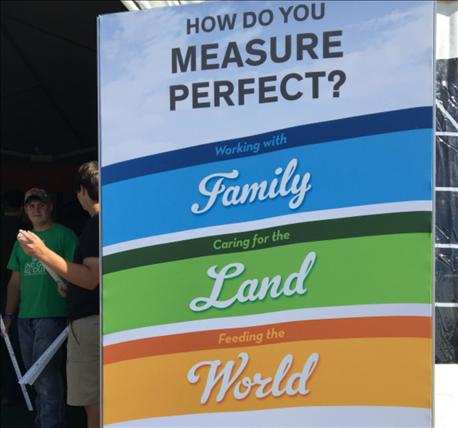
How do you measure perfect? The question made me stop in my tracks during last week's Farm Progress Show in Iowa. I read the sign at the Dow tent again, "How do you measure perfect?"
Merriam-Webster Dictionary defines perfect as "having no mistakes or flaws, completely correct or accurate." In other words, a perfect condition is where everything is 100% great.

GOOD QUESTION: Dow asked visitors to the 2016 Farm Progress Show a great question. And the company offered solid answers.
Shoot, in farming we all know there really is no such thing as perfect. Farmers plant a great field of soybeans and hail destroys it. Or they harvest a bin busting corn crop and commodity prices tank. Livestock producers feed a pregnant cow for nine months only to watch the calf die during birth. Vegetables spoil. Trees burn. The list of imperfections in the farming industry changes depending on the year.
But the question remains in the constantly shifting world of agriculture, how does a farmer measure perfect?
Dow offered up three options that ultimately are at the heart of every farmer and rancher in America.
1. Working with family.
2. Caring for the land.
3. Feeding the world.
Inside the tent, visitors were able to select a button that represented how they measure perfect. As I stood ready to pick out buttons for my family, I realized that each one of us would choose a different button.
My eldest daughter would say that "working with family," is what makes being involved in the agriculture industry perfect. From our hot summers of putting up fence to cold winters in the lambing barn, it was all about being around family. She learned that her "family" in agriculture often extended beyond her parents and sister to include those she showed livestock and attended college with. For her, agriculture is family.
For my husband perfection comes from "caring for the land." Our operation may be small, but he is constantly looking to improve it. Whether it is rotationally grazing our sheep flock so not to overgraze our pastures or planting cover crops to improve soil health, he is always looking for ways to have our livestock work in harmony with our land. After all, like even the largest farmer, there is a desire to leave the land better than you started for the next generation.
The youngest member of the family would definitely say that achieving perfection in the agriculture industry means, "feeding the world." With her mind set on breeding the next generation of seed and a college bill to back that up, our daughter has pursued her only dream--helping to feed a hungry world through plant biotechnology.
I guess that is what makes agriculture unique--farmers and those in the agriculture industry choose every day how they gauge perfection. They realize their joy cannot be based on the weather, markets or consumers. Rather, the measure of a perfect livelihood comes from working with family, caring for the land and feeding the world.
Spot on, Dow. Spot on.
About the Author(s)
You May Also Like






